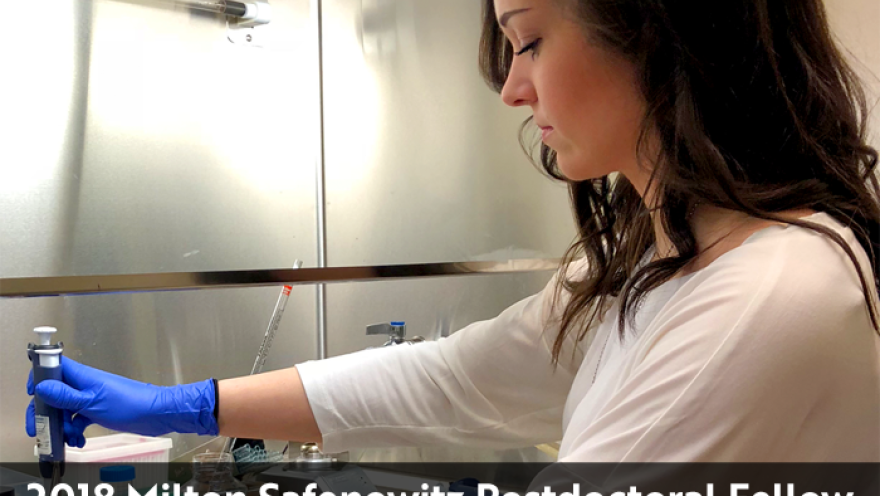Our Milton Safenowitz Postdoctoral Fellowship Program continues to support young scientists and is the only program of its kind specifically funding early ALS postdoctoral fellows.
The awards were founded in memory of Mr. Safenowitz by the Safenowitz family – through The ALS Association Greater New York Chapter. The program encourages young scientists to enter and, importantly, to remain in the ALS field.
We are proud that 76 percent of the postdoctoral fellows we fund go on to start their own labs to continue studying ALS and mentor other young ALS researchers. The rest of our Safenowitz fellowship program graduates go on to careers in the biomedical industry, nonprofits, and medical writing, with many still staying in the ALS space.
This year, we are supporting five new postdoctoral fellows out of a highly competitive applicant pool. Over the next few weeks, we will highlight each fellow – their dedication and unique contributions to ALS research, as well as their interests outside of the lab.
We recently talked with Dr. Alyssa Coyne from Johns Hopkins University to learn about her unique research project focused on understanding the molecular mechanisms underlying the most common form of familial ALS.
Alyssa Coyne, Ph.D.
Johns Hopkins University – Baltimore, Maryland
Mentor: Dr. Jeffrey Rothstein
Project: Mechanistic insights into C9orf72 mediated disruptions in the nuclear pore complex
Why did you choose to focus on ALS research?
I have always been interested in the field of neurodegeneration research, in particular the opportunity to make strides towards helping those affected by devastating diseases. In addition, I believe that, in order to study disease pathogenesis, we first need to fully understand the basic biology of disease-relevant cell types and processes. The field of ALS research allows me to study both basic neuronal biology and translate those findings into a disease setting in hopes of identifying novel therapeutic targets.
What do you like about working in the ALS research field?
[I most like] the fast-paced and highly collaborative environment. There are constantly new discoveries and questions that arise, making the field an exciting area to work in.
What are the goals of your funded research project?
My research is centered around the understanding of the molecular mechanisms underlying the most common form of familial ALS caused by a GGGGCC repeat expansion in the C9orf72 gene. In particular, my work is focused on the nuclear pore complex, which is a gate between the two main cellular compartments (the nucleus and cytoplasm) and functions to control many essential cellular functions.
Disruptions in the transport of macromolecules between the nucleus and cytoplasm (nucleocytoplasmic transport) has recently been implicated in multiple neurodegenerative diseases, including ALS. I seek to not only understand the basic biology of the nuclear pore complex in post-mitotic neurons, but also how alterations in the nuclear pore complex can lead to deficits in nucleocytoplasmic transport and contribute to cellular toxicity and disease pathogenesis.
How might your work impact the ALS community?
While alterations in nucleocytoplasmic transport and the nuclear pore complex have been implicated in neurodegeneration, the mechanisms by which these deficits occur remain poorly understood. In addition, little is known about the basic biology of nuclear pore complex in non-dividing neurons.
My research seeks to comprehensively address both the basic and disease biology of the nuclear pore complex and nucleocytoplasmic transport to reveal novel therapeutic targets for the treatment of this devastating disease and potentially provide insight into related neurodegenerative diseases.
It is often said that ALS is one of the most complex diseases to understand. Yet, you go to work every day to tackle the challenges of your research. What gives you hope that there will someday be a world without ALS?
It is an exciting time to be working in the field of ALS research, with the emerging promise of antisense oligonucleotide therapies now in clinical trial for common genetic forms of ALS.
For sporadic ALS, every day the collaborative environment of the ALS community makes progress towards new discoveries that could lead to future treatments. In addition, working in the lab of Dr. Jeffrey Rothstein, I am exposed to large collaborative projects such as Answer ALS, which uses induced pluripotent stem cells derived from 1,000 individuals living with ALS in order to understand disease pathogenesis.
The incredible efforts by the entire Answer ALS team provide hope that we may one day understand the basis of ALS and be able to use personalized medicine to treat disease.
What is something unique about you?
I have lived in states adjacent to both U.S. borders.
What do you like to do when you aren’t in the lab?
In my free time, I enjoy running and hiking.
Is there anything else you’d like to add?
I would like to thank the patients and their families for their essential contributions to research, as well as all those who donate to The ALS Association and ALS research. Without your contributions, none of [my work] would be possible.


Join the conversation. Please comment below.